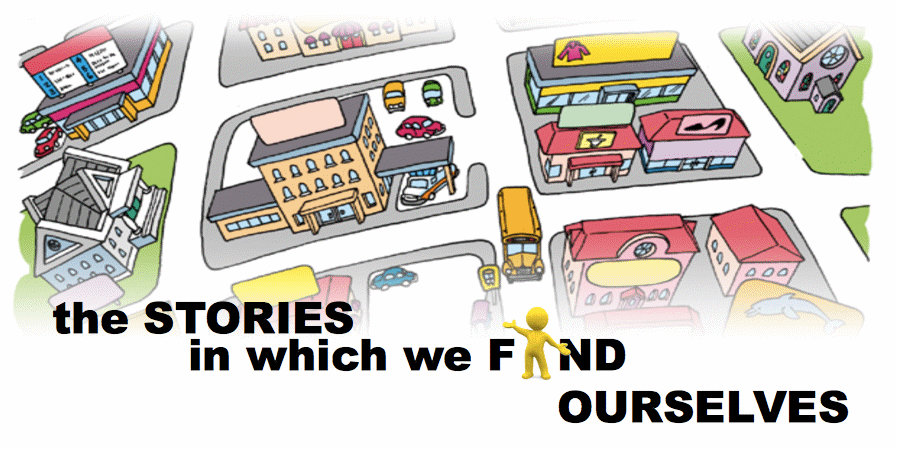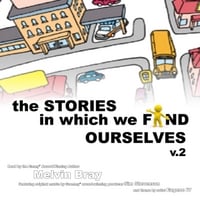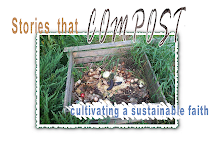A Series of Graciously Unfortunate Events—Episode 3
(from Genesis 3—a story of creation)
Download a dramatic reading of
"A Series of Graciously Unfortunate Event - Episode 3" complete with sound effects and musical score!
"The woman you gave me made me do it!" the man blamed God and the woman.
"But—" God sought to interject.
"Be a man! You could have said no!" the woman retorted.
"Still—" Elohim tried to get a word in.
"Besides, that snake tricked me!" the woman passed the blame.
"Enough!" God commanded their attention. "You both were wrong. And as you can see, it's already begun to cost you. Look at yourselves. You're running from me. Me. I'm the one who loves you no matter what. 'You shall die' wasn't 'I'm going to kill you.' And listen to yourselves. Blaming. Resenting. That can't seem right."
Then Elohim turned his attention, "Don't go slithering off, deceitful one," he said to the snake. Now how the snake got to that exact spot after all that running and hiding, I do not know, but that's how the story's been handed down to us. At this point the narrative in Genesis transitions into poetry again:
"Because you have done this,
cursed are you among all animals
and among all wild creatures;
upon your belly you shall go,
and dust you shall eat
all the days of your life.
I will put enmity between you and the woman,
and between your offspring and hers;
he will strike your head,
and you will strike his heel."
To the woman he said,
"I will greatly increase your pangs in childbearing;
in pain you shall bring forth children,
yet your desire shall be for your husband,
and he shall rule over you."
And to the man he said,
"Because you have listened to the voice of your wife
and have eaten of the tree
about which I commanded you,
'You shall not eat of it,'
cursed is the ground because of you;
in toil you shall eat of it all the days of your life;
thorns and thistles it shall bring forth for you;
and you shall eat the plants of the field.
By the sweat of your face
you shall eat bread
until you return to the ground,
for out of it you were taken;
you are dust,
and to dust you shall return."
So the man and the woman, symbols of all humanity in our story, imagined they knew better, which led them to eat of the one forbidden tree. "And what does God do, inflict immediate capital punishment on that very day as promised? No."* In this sense, the snake hadn't lied. Seems like he understood something about God that many often miss. "God not only doesn’t kill them, but rather God makes clothes for them, mercifully shielding them from their shame at being naked in one another’s presence."* Does that make God a push over? No, again. "God does let them suffer consequences for their behavior, but not lethal ones. God pushes them out of the nest, the garden in which they have lived. Now, they must go from being hunter-gatherers in a beautiful garden to agriculturalists who must struggle with thorns and thistles to produce food by the sweat of their brow, entering into the harsh realities of marital and family struggle in a harsher world, out of the garden, east of Eden. Having tasted of the tree of the knowledge of good and evil, they will no longer have access to the tree of life"* and consequently will someday return to the dust from which they were originally created. And that's how this particular series of graciously unfortunate events ends.
People make sense of this story in many ways. Some feel compelled to want talking snakes and magic trees to be fact for the purpose of believing in them or railing against them. Either way, its the argument—the reasoned legal defense—they seem to want to prepare for, much like the man and the woman in the story. Still others like to think of this story as humanity's great fall ("The Fall") from grace, but it's hard to imagine us falling from or losing what we could do nothing to earn and very little to keep. Thus, I am among those who see this heart rending myth as a classic coming-of-age story filled with deep ambivalence. "Their departure is truly ambivalent, because although it is the result of the disobedience of one command (don’t eat from the forbidden tree), it results in obedience to a former command which never could have been obeyed from within the garden (be fruitful, multiply, fill and subdue the earth)."*
Nonetheless, the man and the woman's losses are painful, and because they persist in similarly behavior, as we will see, it causes great suffering. In addition to losing the garden itself, a lie was deeply embedded in the human psyche that has since changed the way people see themselves (and how they think their Creator sees them). Humanity loss the innocence of believing in their capacity for goodness despite their screw ups. But it is a loss that can only be remedied by owning up to our shortcomings, not by covering up, running and hiding like the man and the woman did.**
There are many concrete experiences that are comparable to the series of graciously unfortunate events found in the third chapter of Genesis. We could go back to the ecological scenario I hinted at earlier and tell the story of short-sighted hunter-gatherers who pick virtually all the fruit from all the trees in their valley during the first month of the growing season, leaving little to sustain themselves for the rest of the season and storing nothing for winter. It wouldn't be long before those who had done this would be forced to relocate for lack of food.
Or we could be more contemporary and imagine a father with a "daughter whom he loves with all his heart. When she comes of age, Dad gives her a beautiful sports car. Dad tells her to drive safely and stay in her lane, but soon she crashes into a tree and totals her vehicle. Dad gives her a stern lecture, and a few months later, replaces the sports car with a modest economy car, more of a starter car, you might say. Then she takes her new economy vehicle off-road and gets stuck in a muddy field. Dad pulls her out and requires her to take a drivers’ ed class before she can drive again. She finishes the class and then a few weeks later she speeds around a corner, recklessly loses control, and drives herself into a river, and the economy car is totaled. At this point, Dad decides she isn’t ready for a car and gives her a bicycle instead. Then she crashes her bike into a tower and breaks her arm. Dad again comes to the rescue and rushes her to the ER. In each case, what does the father do in response to his daughter’s foolishness? Disown her? Lock her in a dungeon? Condemn her to eternal conscious torment? Not even close!"*
However, he does allow her to suffer loss. Imagine how tempted he is to reclaim his almost adult daughter as "Daddy's little girl" forever, excusing her from all the wrong she'll ever do, letting her gorge of the tree of a life that shelters her from the consequences of poor choices and condemning himself to a life of cleaning up after her incessant messes. Instead he says, "No, I won't do that; I'll let her grow up and live with the consequences of her behavior, even though it hurts to see her struggle."
Perhaps the story of the man, the woman and the talking snake isn't about them after all. Perhaps it's about an ever gracious Creator who patiently bears with a careless and shortsighted humanity time and time again.
*Non-dialogue quoted passages that interpret Genesis 3 as a coming-of-age story are taken from A New Kind of Christianity by Brian McLaren.
**The language of "imagination" throughout the story and the explanation of what was lost in the garden comes from conversations with Jonathan Brink, author of Discovering the God Imagination.










No comments:
Post a Comment